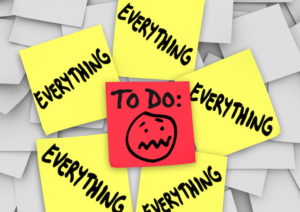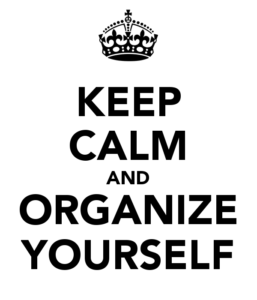I watched an Olivier Roland’s video and I learned good stuff.
If you didn’t read Part 1, click here.
3rd step – organize yourself and communicate
Organize
Managing your schedule helps limit stress and to do that, here’s what you can do :
-
Prevent an additional 10 to 20 minutes on your travel times.
-
Make a list of priority tasks to do and not to do.
-
Identify bad habits, tasks to eliminate and tasks to delegate.
-
Automatize a maximum of tasks.
-
Focus on taks that immediately bring visible results
-
Avoid to scatter you.
-
Stop these time consuming habits like reading your emails as soon as they arrive of watching your smartphone as soon as there is a notification. Tamagochi is a toy, not a lifestyle.
-
Do things in their time. Each task, even minimum, must be completed before moving on the next one. This method allows you to improve your concentration and the satisfaction of having completed a task is very motivating.
-
Pause during the day and cultivate your patience. In a situation where you have to wait, take the time to relax instead of sighing and complaining. For example in a queue for a counter, use that : Wait = relax and breathe deeply. Concentrate on yourself in a positive way and on the present moment.
Communicate
-
Stress is often born from the fact that we don’t know what our interlocutors expect from us. We can’t read people’s minds, so don’t hesitate to ask clearly what people expect of you. Dare to ask questions and create a direct communication. Banish your ego and think that you aren’t absolutely right. You can also avoid sensitive topics.
-
Say « no ». If you can’t render a service someone asks you because you have no time or no resources or you don’t want to take additional responsibilities, then explain that to your interlocutor. Your interlocutors will understand the situation and you will find an arrangement. It’s better to say « no » from the start than to force yourself to keep your commitments. With this attitude, you will avoid being overwhelmed.
4th step – turn away or adapt and accept
-
Avoid the trigger elements of stress. Limit your contact with people who stress you. Be aware of your environment and control that. For example, use an alternative road to avoid traffic jams. Turn off TV to avoid listening to information that makes you anxious. If you did the analysis of 20% of sources that bring you 80% your stress, you know the people that you must see the minimum or eliminate them from your contacts.
-
Adjust yourself by being willing to compromise. Be assertive by adapting your requirements and avoiding perfectionism.
-
Reframe conflicts by analyzing the problem in a positive way. Look at good things and find benefits of the situation. Focus on positive elements.
-
Accept the trigger of stress and admit that you can’t control everything.
-
Looking for opportunities to improve yourself. Concentrate on what this stressful situation can teach you. Follow the principle of this quote : « What doesn’t kill you , make you stronger » and ask yourself these questions : « How can I get better with this experience ? What did I learn ? ».
-
Forgive. Accept that others make mistakes (because you also make mistakes) and try to evacuate any feeling of anger. When you free yourself from all this negative energy, it’s easy to resume your projects.
In summary « The greatest weapon against stress is our ability to choose one thought over another » as William James said.
Subscribe to my newsletter and share this article if you think it can help someone you know. Thank you.
-Steph



